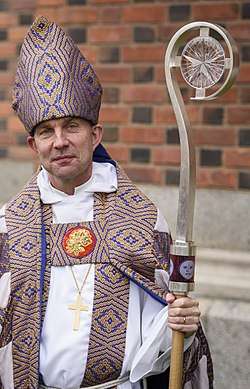Fredrik Modéus
Fredrik Modéus (born October 19, 1964 in Jönköping) is a Swedish theologian and bishop, currently the 59th Bishop of Växjö.[1]
The Right Reverend Fredrik Modéus | |
|---|---|
| Bishop of Växjö | |
 | |
| Church | Church of Sweden |
| Diocese | Växjö |
| Appointed | 2015 |
| Predecessor | Jan-Olof Johansson |
| Orders | |
| Ordination | 1991 |
| Consecration | 12 April 2015 by Antje Jackelén |
| Personal details | |
| Born | October 19, 1964 Jönköping, Sweden |
| Nationality | Swedish |
| Denomination | Lutheran |
| Parents | Adjuncts Nils Modéus and Ingrid Modéus |
| Spouse | Carina Modéus |
| Children | 3 |
| Alma mater | Lund University |
| Motto | Sufficit tibi gratia Dei (God's grace is all you need) |
Priest
Modéus was ordained in 1991 for the Diocese of Växjö. After he served as vicar in Värnamo between 1991-1992. In 1992-1994 he served as a school chaplain in Hässleholm and between 1995-1996 as a school chaplain at Oskarshamns folkhøjskole. In 1996, Modéus moved to Lund and took office as a student clergyman, after which he served as supervisory director between 1997-1999 in the Helgealand Assembly. In 2000 he became a minister at the church of Helgeand in Lund. Between 2009-2014 he studied for a PhD at Lund University graduating in systematic theology on May 13, 2015 with his dissertation titled The Worship Community in the People's Church (Gudstjänstgemenskap i folkkyrkan).[2]
Bishop
In the spring of 2014 he was a candidate for the Bishopric of Lund, where he ended up in second place after Johan Tyrberg. In the autumn of the same year he once again took part in another election, this time for the bishopric of Växjö, where he ended up in the final round together with Thomas Petersson. On December 3, he was elected with 58% of the votes. On April 12, 2015, he was consecrated bishop in the Uppsala cathedral.[3]
Personal life
Fredrik Modéus is the son of Adjuncts Nils Modéus and Ingrid Modéus, as well as brother of Bishop Martin Modéus and lawyer Daniel Modéus. Fredrik Modéus is married to the doctor Carina Modéus. Together they have three children.
References
- "Fredrik Modéus", Lund University, Lund. Retrieved on 08 August 2017.
- "FORSKARSEMINARIET KYRKOHISTORIA OCH PRAKTISK TEOLOGI", Lund University, Lund. Retrieved on 08 August 2017.
- "Biskop" Archived 2014-11-09 at the Wayback Machine, Church of Sweden, Lund. Retrieved on 08 August 2017.